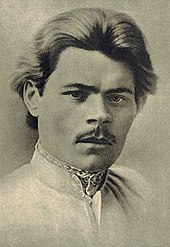My companion
My companion ( Russian Мой спутник , Moi sputnik), also my travel companion , my companion , is a story by the Russian writer Maxim Gorky from 1894, which appeared in the Samara newspaper (Самарская газета - Samarskaja gaseta) that same year .
At a young age Gorky hiked among other things the north shore of the Black Sea . He tells about his four-month journey on foot, which took him from Odessa to Tbilisi in the fall of 1891 . On this journey, his companion, the notoriously work-shy Georgian Schakro from Tbilisi, takes advantage of him .
content
The hiking trail Gorkis and Prince Shakro Ptadze - as the companion imagines - leads to Tbilisi via Kherson , Perekop , Simferopol , Yalta , Feodosia , Alushta , Kerch , Anapa , the area around the Terek , Vladikavkaz , the Darjal Gorge , the Gudaur and Mzcheti . The Kerch Strait is negotiated with a sloop .
In the port of Odessa, Schakro would like Maxim to believe that he had been on the trail of a thief from Kutais in vain and that over time he had run out of rubles abroad . "Prince" Schakro is on the move with the wrong passport - that of a certain hairdresser Wano Swanidze. Because the money for the return ticket to Georgia is missing, Shakro sighs and joins Maxim, who is traveling on foot, to Tbilisi. Gorky writes: “When we arrived in Kherson, I knew my companion as a naive, wild fellow, very uneducated; very happy when he was full and dejected when he was hungry - a good-natured, strong animal. "Maxim provides for Shakro's maintenance.
At the pier of the Kerch customs authority, the two hikers steal a boat and cross the stormy strait at night. During fairly high waves, Maxim saves the life of the "prince". On the other bank - on the Taman peninsula - Maxim and Shakro are lucky. Three good-natured shepherds deliver the two thieves neither to the ataman nor to the tax collector, but help with food on the march.
Shakro makes fun of Maxim on the way into the Caucasus : If both had been handed over to state power by the shepherds, Shakro would have talked his way out by portraying his breadwinner Maxim as a potential murderer. The rest of the hiking trail only needs to be paved occasionally. By accepting temporary work on the go, Maxim can feed the mostly hungry idler Schakro and himself. When the two hikers enter Shakro's hometown of Tbilisi, the Georgian nobleman becomes more and more monosyllabic. Near the Olginskaya in Tbilisi, the prince sets out to never see him again. Gorky closes his story: "He [my companion] taught me a lot that one will not find in the thickest tomes of wise men."
The special thing about the story is its form: Ludwig calls Schakro a “depraved son of wealthy parents”, but Gorky tells the story in such a way that the unsuspecting reader has to ask himself for a long time: Is Schakro really a man of nobility or gives does this impostor just look like a prince? Ultimately, the reader receives no answer from Gorky.
filming
- 1968, Soviet Union : Fyodor Filippow (russ. Фёдор Филиппов) created Through Russia among others using the short story. Alexei Loktew played Maxim and Georgi Kawtaradze played Prince Shakro. The film was released in GDR cinemas at the end of February 1969 .
German-language editions
- Maxim Gorki: The wooden rafts and other stories. Only authorized translation from Russian by August Scholz . 507 pages. Malik-Verlag , Berlin 1926 ( Makar Tschudra. About the siskin who lied and the woodpecker who loved the truth. Jemeljan Piljaj. Grandfather Archip and Lenjka. Tschelkasch . Once in autumn. The song of the falcon. A mistake. The old one Isergil . The story of the silver lock. My traveling companion. The wood rafts. Bolek. In Weltschmerz. Konovalov . The Khan and his son. The exit ).
First edition
Maxim Gorki: My companion and other stories. German by Alexander Eliasberg . People's Association of Book Friends, Wegweiser-Verlag, Berlin 1921.
- Used edition
- My companion. German by August Scholz. P. 404-435 in: Maxim Gorki: Erzählungen. First volume. Aufbau-Verlag, Berlin 1953.
literature
- Nina Gourfinkel: Maxim Gorki. With testimonials and photo documents. Translated from the French by Rolf-Dietrich Keil . Rowohlt, Hamburg 1958 (1986 edition), ISBN 3-499-50009-4 .
- Nadeshda Ludwig: Maxim Gorki. Life and work. Series of Contemporary Writers. People and Knowledge, Berlin 1984.
Web links
- online text in the Gutenberg-DE project (Alexander Eliasberg translated Мой спутник with Mein Weggenosse )
- online work text at Lib.ru / Classic (Russian)
Remarks
- ↑ The first-person narrator could be Gorky himself, because his companion addresses him as Maxim (edition used, p. 434, 1st Zvu). Ludwig puts it into perspective: "In this way, the fictional narrator Maxim ... becomes an artistic object consciously designed in the narratives, which the author is at times a little mocking, but always benevolent." (Ludwig, p. 39, 13. Zvu)
- ↑ The Olginskaya road (Ольгинская) leads from Tbilisi to the north (see also photos of the road).
Individual evidence
- ↑ Edition used, p. 491, 2nd entry
- ↑ Gourfinkel, p. 129.
- ↑ Edition used, p. 435, 9. Zvo
- ↑ Edition used, p. 491, 2nd entry
- ↑ Edition used, p. 407, 10. Zvo
- ↑ Edition used, p. 435, 5th Zvu
- ↑ Ludwig, p. 39, 14. Zvo
- ↑ Russian По Руси (фильм)
- ↑ Russian Локтев, Алексей Васильевич
- ↑ Russian Кавтарадзе, Георгий Георгиевич
- ↑ Through Russia in the IMDb
- ^ Deutsche-biographie.de : August Scholz
